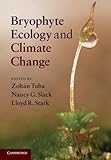Bryophyte ecology and climate change / [edited by] Zoltán Tuba, Nancy G. Slack, and Lloyd R. Stark.
Publication details: Cambridge ; New York : Cambridge University Press, 2011.Description: xxi, 506 p. : ill. ; 26 cmISBN:- 9780521767637 (hardback)
- 9780521757775 (paperback)
- 588.1722 22 BRY
- Q
| Item type | Current library | Call number | Copy number | Status | Date due | Barcode |
|---|---|---|---|---|---|---|
 Book Open Access
Book Open Access
|
Science and Education Library | 588.1722 BRY 1 (Browse shelf(Opens below)) | 1 | Available | NAGL24010811 |
CONTENTS
Introductory Chapters
Ecophysiology
Aquatic Bryophytes
Desert and Tropical Ecosystems
Alpine , Arctic , and Antarctic Ecosystems
Sphagnum and Peatlands
Includes bibliographical references and index.
"Bryophytes, especially mosses, represent a largely untapped resource for monitoring and indicating effects of climate change on the living environment. They are tied very closely to the external environment and have been likened to 'canaries in the coal mine'. Bryophyte Ecology and Climate Change is the first book to bring together a diverse array of research in bryophyte ecology, including physiology, desiccation tolerance, photosynthesis, temperature and UV responses, under the umbrella of climate change. It covers a great variety of ecosystems in which bryophytes are important, including aquatic, desert, tropical, boreal, alpine, Antarctic, and Sphagnum-dominated wetlands, and considers the effects of climate change on the distribution of common and rare species as well as the computer modeling of future changes. This book should be of particular value to individuals, libraries, and research institutions interested in global climate change"-- Provided by publisher.
"This book is dedicated to Zoltan Tuba. Its origin was a symposium entitled Ecological Responses of Bryophytes to Changing Climate. It was presented at the American Bryological and Lichenological Society (ABLS) meeting with the Botanical Society of America (BSA) in Chico, California in 2006. Nancy Slack, then president of ABLS, and Zoltan Tuba of Godollo University, Hungary, organized the symposium, which included speakers from many different countries. An editor at Cambridge University Press (England) saw the program on the Internet and asked the organizers to write a book on this subject. All the symposium speakers agreed to contribute chapters and subsequently others doing important work in this field were asked to join them"-- Provided by publisher.


There are no comments on this title.